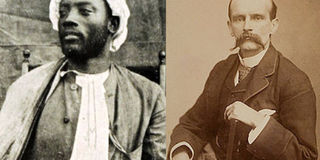Capt Lugard meets Kabaka Mwanga

Kabaka Mwanga the Buganda king, who welcomed Capt Lugard (R).
I crossed the Nile without waiting for permission, and marching rapidly on the capital, selected my own camping-ground. Mackay and Ashe relate how they knelt before the king, when praying for permission to leave the country. Such an attitude seemed to me to lower the prestige of Europeans, and I determined to make my own methods the more marked by contrast.
The arrival
I had at my disposal on entering Uganda about 270 porters; some of them brave fellows, but undisciplined, and very excitable, and liable to panic; others absolutely useless for fighting. Roughly one third might be set down as good, one-third as indifferent, and one third as useless. I had extremely little ammunition, my total reserve was also in very bad condition, it consisted of only some 11 rounds per man, with four boxes of Maxim ammunition, and one of Winchester with which rifles the Europeans, Shukri, and Dualla were armed.
I had also some 50 Sudanese and Somalis, most of whom were brave and reliable men, and to some extent disciplined; but I could not speak their language, and relied on my factotum, Dualla, to interpret my orders to them.
On arrival, I got a polite message of welcome.
In pursuance of my intention to let the king see that I did not consider myself at his orders, I sent a message on arrival, thanking him for his welcome, and saying that, as I was tired and had much work to do, I would defer seeing him till next day (December 19); nor did I hasten even then on arrival of his messengers, but went at my leisure.
I took a dozen Sudanese with me, and their arms and bugle-flourish made my show in this respect nearly as good as the king’s. He has quite a band of drums and other kinds of noise to herald the approach of a visitor, and these all struck up just as I drew up my little Sudanese guard.
Face to face with the king
They remained close outside facing the baraza door. I found the king in the durbar-hut, surrounded by a mass of humanity, packed in every cubic inch of space in the not very large hut. I entered and sat on the chair on his right, taking care not to tread on his carpet for I had been warned, and could see that he was anxious I should not do so. We shook hands cordially.
For till now I had no idea he was the murderer of Hannington, I thought it was his father Mtesa (Mutesa). He is a young man whose features are negroid, but show traces of Wahuma blood (bahima); his face betokens irresolution, a weak character, and a good deal of sensual sensuality.
I produced my three letters, two from Mr Mackenzie and one from Sir F. De Winton. He said, ‘Wait till the white men come.’ I replied that I had brought letters for the king himself, and would read them without waiting. I did so, the letters having been translated into simple English by me, into Swahili by Dualla, and into Kiganda (Luganda) by the interpreter.
I had just finished, when, to my surprise, the Revs, Walker and Gordon were ushered in. I suppose the king sent specially for them.
They were asked again to translate the letters, which they did. The court was crowded with Roman Catholics, all in nervous anxiety to hear what I would say.
The Protestants, fancying, I suppose, that they were on the safe side, had only come in very small numbers. When the letters were finished, I said several times that I had come in the hope of bringing peace to the country, and of settling all disputes, that I had come with full powers to make treaties, and not merely at the invitation of the king, without definite instructions from England.
My own master
He asked no impertinent questions about my men and guns. When these preliminaries were finished, I said I would like to introduce Dualla and Shukri, and then I said I had come merely to pay salaams, and would talk of other matters by-and-by.
There was very great relief and joy in the court at there being no mention in the letters or by me of a flag. It appears they are nervously afraid of a flag, understanding that it means that they give away their country, and the Wa-Fransa (French) are prepared possibly to fight sooner than accept it.
The king gave an order in court to send me food for my men. It is the custom, I believe, for the king to dismiss the baraza, but I asked Gordon if I should transgress greatly by taking my own conge, and he said he thought not. So I rose, and said I had finished my words for to-day; and with great cordiality and many salaams (thank you) and hand -shakings I left, and the king and court rose and left by the other door.
This was a final assertion that I was my own master, and, of course, though I have taken this somewhat independent attitude, I have been at great pains to show that it does not arise from mere bravado, or a wish to wound the susceptibilities of the king.
Who was F. D Lugard
Frederick John Dealtry Lugard, Baron Lugard of Abinger was born in 1858 at Fort St. George, Madras, India and died April 11, 1945 in England. He was an administrator who played a major part in Britain’s colonial history between 1888 and 1945, serving in East Africa, West Africa, and Hong Kong.
His name is especially associated with Nigeria, where he served as high commissioner (1900–06) and governor and governor-general (1912–19). He was knighted in 1901 and raised to the peerage in 1928.
Compiled by Henry Lubega
[email protected]




